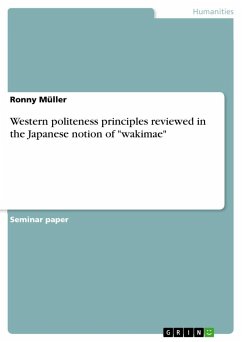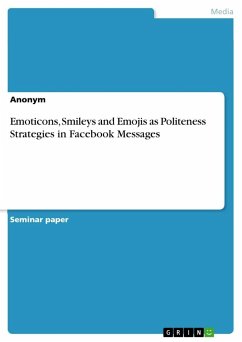
Politeness and Face Threatening Acts in Iraqi EFL Learners' Conversations. English as a Foreign Language

PAYBACK Punkte
0 °P sammeln!
Academic Paper from the year 2019 in the subject Sociology - Communication, University of Thi-Qar (College of Education), language: English, abstract: This study examines the use of face threatening acts and politeness of the Iraqi EFL learners in their conversations. The study reviews a theoretical background to the theory and the data are analysed according to an eclectic model. The study applies the model to one hundred of Iraqi university students' conversations. The study tries to detect, analyse and discuss the type and the number of politeness strategies and face threatening acts used b...
Academic Paper from the year 2019 in the subject Sociology - Communication, University of Thi-Qar (College of Education), language: English, abstract: This study examines the use of face threatening acts and politeness of the Iraqi EFL learners in their conversations. The study reviews a theoretical background to the theory and the data are analysed according to an eclectic model. The study applies the model to one hundred of Iraqi university students' conversations. The study tries to detect, analyse and discuss the type and the number of politeness strategies and face threatening acts used by the students and to testify the four hypotheses that are postulated in the study. The hypotheses of the study include that the most politeness strategy used by the students is negative politeness and there is a misuse of the face threatening acts by Iraqi EFL learners. "Face" is a linguistic term that is used in semantics, pragmatics, sociolinguistics, as well as sociology, psychology, andpolitical science. The term is now used in different cultures in a metaphorical sense to mean the reputation or the standing in the society. Goffman defines the term as "the positive image you seek to establish in social interactions". Brown and Levinson believe that in performing a particular speech act in a particular context, the face-wants of the participants are threatened and politeness takes place to modify these face threatening acts. Furthermore, the counteractions that the participants make when they fail to perform a self-image competently are called "face-work". J. Thomas indicates that politeness makes an equality in any social interaction. Politeness is a pragmatic theory that means "saying the socially correct thing...(and) is developed by societies in order to reduce friction in personal interaction". Brown and Levinson's theory of politeness is still the basis for the latter theoretical and empirical works on this theory.













